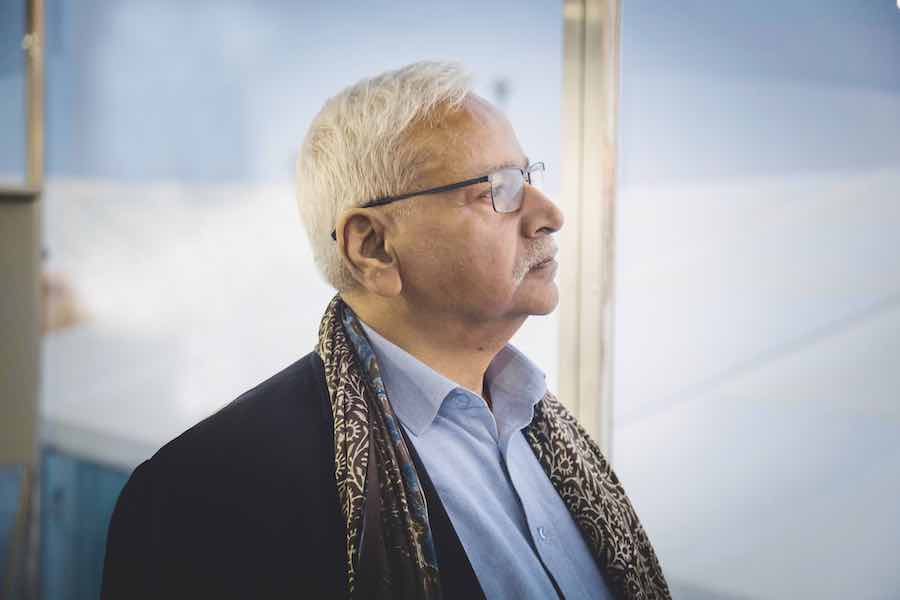For decades, Saleemul Haq has advocated for countries vulnerable to climate impacts. The Bangladeshi British scientist is director of the International Centre for Climate Change and Development in Dhaka, Bangladesh. In 2022, he received the Order of the British Empire for his work building climate expertise in Bangladesh, the United Kingdom and around the world.
Last December, the United Nations Climate Change Conference (COP27) created a fund to help developing nations recover from the impacts of worsening climate change. Known as “loss and damage,” the fund was the result of a decades-long battle waged by developing countries, and Huq played an influential part. David Geselbracht spoke to Huq, whose office is in Dhaka.
You may unsubscribe from any of our newsletters at any time.
DAVID GESELBRACHT: Describe “loss and damage.”
SALEEMUL HUQ: Under the UN Framework Convention on Climate Change [UNFCCC], the term refers to the losses and damages that are occurring because of human-induced climate change. Due to the emissions of greenhouse gases over the last 150 years, we have raised the global average temperature well above 1.1 degrees centigrade. Around the world, as weather patterns shift, we are seeing the impacts of this through the loss of human lives, homes and businesses. We used to think these damages would occur in the future, but they’re happening now.
DG: What other impacts are we seeing?
SH: In two different parts of the world, we’ve seen major and unprecedented events. First, the tiny island country of Vanuatu in the Pacific got hit by two cyclones within a matter of days. This is unheard of, and it caused devastation that the country is still recovering from. A few days later, Cyclone Freddy travelled across the Indian Ocean. It hit Madagascar, then struck Malawi and Mozambique in Africa. This again caused a lot of devastation. Normally, once a cyclone coming in from the sea hits land, it dissipates. Freddy didn’t do that — it went back out to the sea, collected more energy, came back and hit Malawi again in a much more devastating manner. More than 400 people lost their lives.
These are just two examples. We are going to see more and more going forward. Unfortunately, we have entered what I call the “era of loss and damage from climate change,” and no country is prepared — not even the United States.
DG: At COP27 in Egypt last year, a deal was made to finally create a fund for loss and damage issues. Why was this decision important?
SH: All the countries in the world agreed that addressing loss and damage is now essential. Therefore, they agreed to come together to set up a funding mechanism to provide funds to the victims of climate change, particularly the poorest victims in the poorest countries. They’ve already set up a transitional committee with representatives from all the different groups in the UNFCCC. This committee will meet three times before COP28, which will be in Dubai this December. They’ve started to try to figure out how the funding mechanism will be set up and how it will exactly work.
More on Broadview:
- Why we need climate reparations
- How to deal with the end of the world
- The United Church has an ambitious climate goal — but it needs help from congregations
DG: Developed countries have been historically reluctant to agree to a funding deal like this. Why is that the case?
SH: The resistance has come from primarily the United States along with other rich countries. It comes from the view that, by creating an official funding mechanism to support victims of climate change, it would open them up to legal liability and compensation claims. Since richer countries emit the vast majority of emissions, they could be more liable for resulting damages.
Therefore, at the very last hour at COP27, the only way to get the United States to agree to a deal was on the condition that the deal would not invoke any mention of liability or compensation.
Instead, the principle invoked was one of responsibility: that all countries emit greenhouse gases and therefore all are responsible. To ensure the financing mechanism went ahead, we from the developing countries agreed to this condition. When the fund is set up and operationalized, it will act like a solidarity fund. All countries will be invited to contribute, and the most vulnerable countries would be the eligible recipients of that fund.
DG: How did you originally start working in this field?
SH: I started my career about three decades ago as a natural scientist in Dhaka. I used to work on environmental issues and got involved in some of the earliest studies on climate change impacts, particularly in Bangladesh but also in other developing countries. Soon, I began helping the most vulnerable countries, mainly in Asia and Africa, understand the impacts of climate change. At the time, climate impacts were anticipated, but they were not really happening like they are today. No one was ready for these impacts, so we had to come up with plans to help these countries prepare for what was coming — what we call “adaptation.”
Over the last 20 years, we’ve done a lot of work on adaptation. The latest assessment report from the Intergovernmental Panel on Climate Change was the first time global scientists actually said, “We can now see climate change impacts, and they are due to a one-degree centigrade temperature rise caused by humans.” So it’s no longer something we are anticipating; it’s already happening. With this shift, my work has also shifted.
DG: Are there any specific loss and damage issues that sometimes get overlooked?
SH: We often talk about rapid-onset events, like cyclones or wildfires, but there are a whole series of slow-onset events like sea level rise. This is what is happening in Bangladesh, which is a low-lying country where tens of thousands of people in coastal areas can no longer reside. The land has gone underwater. And the seawater, which is of course saline, has entered aquifers and into farmland, so many can no longer grow crops.
Every day, more than 2,000 climate-displaced people from coastal zones are arriving in Dhaka and disappearing into the more than 200 slums we have here. Nobody knows them. Nobody’s doing anything for them. With these slow-onset events, nobody even knows who the victims are, but there are thousands of them, and they will become tens of thousands and then hundreds of thousands of climate migrants. We are not ready for this at all.
Want to read more from Broadview? Consider subscribing to one of our newsletters.
DG: After the agreement at COP27, do you feel hopeful that funding will start to flow and begin to help the countries most affected?
SH: Despite the delays, I feel very optimistic. What was seminal about COP27 was that every country was in agreement. Now, there are still different views on the best way forward, and there’s no simple answer. We will probably end up with a mosaic of different options, with some actions happening under the UNFCCC, that we create, and some happening outside the UNFCCC, that we support. That’s the job of the transitional committee. Then at COP28, they will make recommendations on what we should do next to create a new fund, what the fund would do, how it would operate and how it will get money. Hopefully, at COP28, we can start raising money for the fund and then get it to help people.
DG: Do you foresee a problem in this process?
SH: We often work on what I call “UNFCCC time.” We’ll talk for three or four years before we see any money. I’m advocating for them to work in “reality time,” which means delivering by COP28 — not COP29, COP30 or COP31. They must deliver in “reality time” because the people in Malawi are suffering today. They can’t wait three years to get some money. They need money quickly and immediately. The urgency has to be felt by everybody, and I think that they do feel it. With goodwill on all sides, we will be able to work on this issue faster than we’ve done on previous issues and deliver funding at record speed.
This interview was edited and condensed for length and clarity.
CORRECTION: A previous version of this interview credited the photograph of Saleemul Huq to Stephen Voss and the scientific journal Nature. The photograph was actually taken by Sima Diab.
***
David Geselbracht’s writing has appeared in Canadian Geographic, The Globe and Mail and The Narwhal, among others.
This story first appeared in Broadview’s October/November 2023 issue with the title “Moment of Truth.”
We hope you found this Broadview article engaging.
Our team is working hard to bring you more independent, award-winning journalism. But Broadview is a nonprofit and these are tough times for magazines. Please consider supporting our work. There are a number of ways to do so:
- Subscribe to our magazine and you’ll receive intelligent, timely stories and perspectives delivered to your home 8 times a year.
- Donate to our Friends Fund.
- Give the gift of Broadview to someone special in your life and make a difference!
Thank you for being such wonderful readers.
Jocelyn Bell
Editor/Publisher














